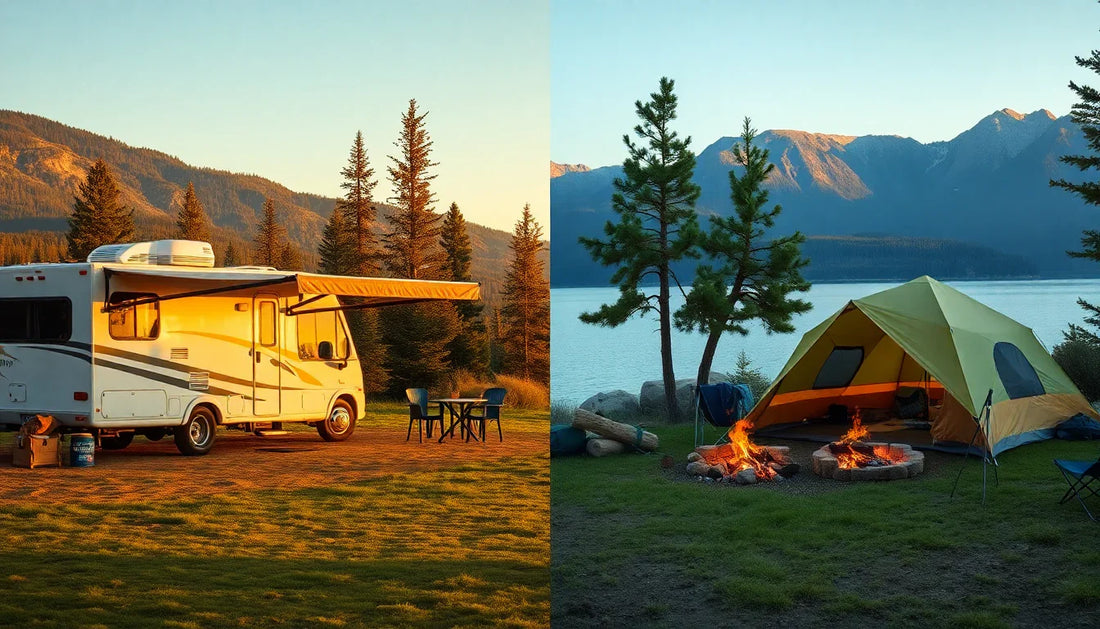
RV Camping vs Tent Camping: Which Suits Your Lifestyle?
Share
When it comes to outdoor adventures, the choice between RV camping and tent camping can significantly impact your overall experience. Both offer unique advantages and cater to different preferences, budgets, and lifestyles. As you embark on your next camping journey, it's essential to weigh the pros and cons of each approach to ensure you make the most of your time in the great outdoors.
Tent Camping: Pros and Cons
Tent camping is often considered the more traditional and cost-effective option for outdoor enthusiasts. Its primary appeal lies in the direct connection with nature, allowing campers to immerse themselves in the sights, sounds, and smells of their surroundings. The simplicity of setting up a tent and sleeping under the stars can be a deeply rewarding experience, fostering a sense of adventure and self-reliance.
However, tent camping also comes with its own set of challenges. The lack of amenities, such as running water, electricity, and climate control, can be a significant drawback for some. Inclement weather, insects, and the need to pack and carry all necessary gear can add an element of discomfort to the experience. Additionally, the limited storage space in a tent may require more careful planning and packing, which can be a deterrent for those seeking a more carefree camping trip.
RV Camping: Pros and Cons
In contrast, RV camping offers a more luxurious and comfortable alternative. Recreational vehicles (RVs) provide a wide range of amenities, including beds, kitchens, bathrooms, and climate control systems, making the camping experience more akin to a home-away-from-home. This level of comfort and convenience can be particularly appealing for families, couples, or those seeking a more relaxed and hassle-free outdoor adventure.
The mobility and flexibility of RVs also present significant advantages. Campers can easily relocate to different destinations, explore new areas, and enjoy the convenience of having their living space and transportation in one. This versatility can be especially beneficial for those who enjoy the freedom to change their plans or extend their trips on a whim.
However, the initial investment and ongoing costs associated with RV ownership can be a significant drawback. RVs generally require a larger upfront financial commitment, as well as ongoing expenses for maintenance, insurance, and fuel. Additionally, the size and maneuverability of RVs may pose challenges in certain camping environments, such as narrow roads or limited parking spaces.
Lifestyle Considerations
When deciding between RV camping and tent camping, it's essential to consider your personal lifestyle and preferences. For families or groups, the amenities and space provided by an RV may be a more practical and comfortable choice, allowing for shared activities, meals, and relaxation. Solo travelers or adventurous individuals, on the other hand, may find the simplicity and immersion of tent camping more appealing.
Weekend warriors who seek quick getaways may prefer the ease and convenience of RV camping, while full-time or long-term campers may opt for the cost-savings and self-reliance of tent camping. Ultimately, the decision should be based on your specific needs, budget, and the type of camping experience you hope to create.
Budget Comparison
The financial aspect is another crucial factor to consider when choosing between RV camping and tent camping. Tent camping is generally the more budget-friendly option, with lower initial costs for the equipment and ongoing expenses for campsite fees, food, and other supplies. RV camping, while offering more comfort and convenience, typically requires a significant upfront investment in the vehicle, as well as ongoing costs for maintenance, insurance, and fuel.
However, it's important to weigh the long-term costs and potential savings associated with each option. RV owners may benefit from the ability to cook their own meals, have access to on-board amenities, and potentially save on hotel stays during extended trips. Careful budgeting and research can help determine the most cost-effective solution for your camping needs.
Comfort and Convenience
When it comes to comfort and convenience, RV camping often has the upper hand. The inclusion of features like beds, bathrooms, and climate control systems can provide a level of luxury and relaxation that is difficult to replicate in a tent. Additionally, the ability to store and transport more gear, supplies, and personal items can make the camping experience more enjoyable and less physically demanding.
Tent campers, on the other hand, must be more mindful of their packing and be prepared to adapt to the elements. The simplicity of tent camping can be a draw for those seeking a more rugged and immersive outdoor experience, but it may require more effort and compromise in terms of comfort and convenience.
Off-Grid and Sustainability
Both RV camping and tent camping offer opportunities for off-grid and sustainable experiences, though the approaches may differ. Tent campers often have a more direct connection to the natural environment, with a smaller footprint and the ability to leave minimal impact on the surroundings. RV campers, however, can leverage technology and equipment to achieve a level of self-sufficiency, such as solar panels, water filtration systems, and waste management solutions.
Ultimately, the environmental impact and sustainability of your camping experience will depend on your personal choices, the equipment you use, and your commitment to responsible outdoor practices, regardless of the camping style you choose.
Conclusion
Choosing between RV camping and tent camping is a highly personal decision that should be based on your individual preferences, budget, and lifestyle. Both offer unique advantages and cater to different camping experiences, from the rugged simplicity of tent camping to the comfort and convenience of RV camping.
As you weigh the pros and cons of each approach, consider your priorities, the type of outdoor adventure you seek, and the long-term sustainability of your camping habits. By aligning your camping style with your personal needs and values, you can ensure a fulfilling and memorable outdoor experience that truly suits your lifestyle.
